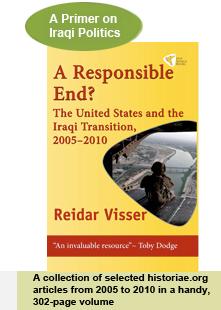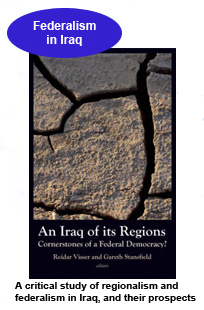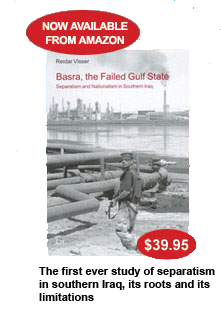



| Main | |
| Documents & images | |
| Links | |
| Contact | |
 | |
| amazon.com |

|
|
|
amazon.com
amazon.co.uk |
|

|
|
|
amazon.com
amazon.co.uk |
|
No Longer Supreme: After Local Elections, ISCI Becomes a 10 Per Cent Party South of Baghdad
By Reidar Visser (www.historiae.org)
5 February 2009
The provisional results of the Iraqi local elections, released today, can be summarised in three main points as far as the areas from Baghdad and southwards are concerned: Maliki and his Daawa party are big winners everywhere and particularly so in the big cities of Basra and Baghdad; the Islamic Supreme Council of Iraq (ISCI) has been decimated across the country; fragmentation rather than the emergence of a clear secular “third way” is mostly the rule, with the exception of a respectable 9% for Iraqiyya in Baghdad and a couple of local secular successes (including Karbala).
Maliki’s rise is spectacular. His coalition won Basra and Baghdad and came first in every Shiite-dominated governorate except Karbala (where the independent Yusuf al-Hububi won most votes), with results above 35% in Basra and Baghdad,around 23% in Dhi Qar and Qadisiyya, and between 10 and 20% in most other places. It should however be stressed that Maliki’s increasing appeal to Sunnis, while often acknowledged by Iraqi Sunnis themselves, is not convincingly reflected in the results. There may have been Sunni votes for Maliki in places like Baghdad and Basra, but his coalition did not run in Anbar, and achieved only 3% in a heavily Sunni province like Salahaddin and less than that in Nineveh.
The decline of ISCI is equally remarkable. From a position where it dominated most governorates south of Baghdad it has fallen to a status of a 10% party or less in most places. As indicated in the table below, it managed to hold on to 2005 levels only in Maysan, was strongly reduced in Baghdad and lost votes even in Najaf where its leadership in provincial government has been more valued by the inhabitants than elsewhere in Iraq.
Province |
2005 percentage of SCIRI (now ISCI) votes |
2009 percentage of ISCI votes |
Basra |
36 (coalition) |
11 |
Maysan |
11 |
14 |
Dhi Qar |
19 |
12 |
Muthanna |
14 |
9 |
Wasit |
59 (grand coalition) |
10 |
Qadisiyya |
30 |
11 |
Babel |
39 (coalition) |
8 |
Najaf |
45 |
14 |
Karbala |
35 (coalition) |
6 |
Baghdad |
39 |
5 |
Of the various pro-Sadrist lists, it is generally the “independent current” (list 284) that has done well, mostly scoring between 5 to 10% – hence, still a force to be reckoned with in Maysan, and with a better result than ISCI in Baghdad. Fadila lost seats across the country and was reduced to a humiliating 3% even in its stronghold of Basra (where its performance in the executive branch of the local government, won in 2005, has been criticised). Ibrahim al-Jaafari's breakaway faction of the Daawa, which has been courting Sadrists, did reasonably well with a consistent score between 5 and 10 per cent.
There had been some talk of secularism emerging as an independent current this time; south of Baghdad this is generally reflected in a fragmentation of the vote in many councils, with lots of parties winning between 1 and 2%, and with further fragmentation and disproportionality expected to occur during the distribution of seats (when one-person lists are at disadvantage after they have secured a single seat because in contrast to the parties their surplus votes are not transferred anywhere and hence wasted). The exception, as far as voting goes, is Karbala (in terms of seat-counting, this is however a one-person list), and to some extent Baghdad itself, where Iraqiyya got around 10%. (North of Baghdad, there is a good 13% result for Iraqiyya in Salahaddin and generally respectable figures for the list of Salih al-Mutlak and others challenging the more explicitly sectarian Sunni orientation of the Iraqi Islamic Party.) The emergence of the “Association of Justice and Unity” list in Basra with more than 5% seems a promising beginning for this party which originates with the Shaykhi community (a Shiite sub-sect) but appears to have been able to appeal to Basrawis at large.
Beyond the numbers, these elections have several implications for the overall atmosphere of Iraqi politics. One is that they to some extent mark a rejection of sectarian identity politics. The cleavage between ISCI and Daawa during the elections campaign ran precisely along these lines: Maliki tried to emphasise Iraqi nationalism; ISCI tried to emphasise sectarian Shiism. Maliki won. Secondly, the results clearly signify the triumph of centralism over pro-federal sentiments. Again, Maliki very explicitly emphasised this contrast between himself as favouring control by Baghdad and ISCI as the party of radical decentralisation. Reflecting the poor result in the recent federalism initiative in Basra (it has been reported that the final number of signatures was actually somewhat lower than the 34,000 originally collected to get the process going), no pro-federal Basra parties did well with the possible exception of the above-mentioned “Association of Justice and Unity” (5.5%)
Overall, this should serve as a wake-up call to the outside world, which tirelessly has sought to comply with the sectarian logic embraced by ISCI – in terms of ethno-sectarian quotas, sectarian variants of federalism, and the retrograde concept of “disputed areas”. It is high time that Western politicians realise that the party they have been considering as the key to Iraq’s Shiite community (and sometimes have singled out as the likely provider of the next Iraqi premier) actually commands less than 10% support in the constituency it purports to represent. In other words, for much of the period since 2003, America’s policy in Iraq has probably not enjoyed the support of more than 25% of the country’s politicians (the two Kurdish parties and ISCI). Yet, still today, Iraqis continue to be the prisoners of the ethno-sectarian system of government that emerged in this period and was designed by the two Kurdish parties and ISCI. Even the UN special representative in Iraq, Staffan de Mistura, seems to miss the point when he in a recent Washington Post op-ed claimed there is a need for “greater willingness to seek national reconciliation at all levels and among all major groups: Sunni-Shiite, Shiite-Shiite, Sunni-Sunni, Arab-Kurd and Kurd-Kurd.” What these elections go some way to show is that Iraqis are tired of these labels as such.
There are big tests ahead for Maliki’s “centralism” or even “Iraqi nationalism” (it was these two features, rather than a sometimes-trumpeted “secularism”, that dominated the campaign of his party). At the local level, will the Daawa engage in bold coalition-building outside the Shiite Islamist camp, or will it give in to advances from ISCI? And what about the parliamentary situation and the next speaker – will the Daawa think in terms of a “Sunni quota” or will it switch allegiance to the 22 July parties and the idea of a “nationalist” speaker of whatever sect? Finally, the next parliamentary elections scheduled for December: will Maliki now seek to convert all his nice words about centralism into specific proposals for constitutional reform? Only then will the positive tendencies seen in this election create an enduring result for the long term. The ”No Injuries Reported in Iraqi Elections”, as per a recent New York Times headline, is in itself without much significance in the absence of true political reform.
Note: Some of the percentage figures are given as heard on Iraqi television and there may be minor inaccuracies although the big picture should be correct.
Earlier articles featuring discussion of the level of popular support for ISCI/SCIRI:
SCIRI, Daawa and Sadrists in the Certified Iraq Elections Results
Beyond SCIRI and Abd al-Aziz al-Hakim: The Silent Forces of the United Iraqi Alliance
Copyright © 2005-2008 historiae.org & Reidar Visser
This document or quotes from it may be freely reproduced as long as www.historiae.org is credited as the original source.
